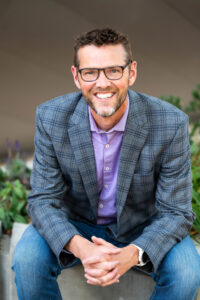True confession: It’s only May, and I’m already tired of election season. Don’t get me wrong, I worry about the societal effects shifting the balance of the Supreme Court would have and cringe at the thought of releasing Donald Trump, a leader with the subtlety of a sledgehammer, on the world stage. I haven’t booked a one-way ticket to Canada, but will be the first to admit that I need help navigating our current social and political climate.
David Kim, from the Center for Faith & Work (Redeemer Church in New York), offered much-needed perspective at events Denver Institute hosted for local professionals and ministry leaders. His challenge to apply a biblical theology of exile to our work and civic life encouraged me to trust God and reengage the political process. I encourage you to spend a few minutes watching his presentation or keep reading for my reflections.
Strangers in a Strange Land
Kim builds his argument around the theology of exile, a principle based in Old Testament history, that shaped the thinking of the early Church. Throughout Israel’s history, God allowed his people to be taken captive by foreign powers and removed from the safety of their homeland for a season of judgment and renewal.
Daily life and religious practice became murky as the Israelites struggled to maintain their cultural and spiritual distinctiveness in a foreign country. Centuries later, the early Christians experienced a similar disorientation as they attempted to follow Christ in a culture that resisted their efforts. Scripture speaks to this tension and offers insight as relevant to modern life as it was during the Babylonian captivity or the Roman occupation of Jerusalem.
Reframe
Passages like Hebrews 11 challenged early believers to reframe their experience by seeing themselves as “strangers and exiles on the earth.” In the midst of its present struggles, the church was encouraged to maintain an eternal perspective—to look forward “to the city that has foundations, whose designer and builder is God.”
As Kim explains, “When the church has an understanding of itself, it’s always in the context of being aliens, strangers, sojourners, or exiles… In the [minds] of God’s people, one of the controlling paradigms was exile.”
According to a theology of exile, we should not be surprised by the tension we experience as we interact with the broader world; rather, we should expect it to be the norm. Understanding life as an exile empowers us to navigate the challenges we face with greater resilience and courage. To illustrate his point, Kim contrasts the perspective of people living in Jerusalem, where culture centered around religious life and values, to those living in exile:
Life in Jerusalem:
Assume that your values will be reflected in the broader culture
Expect comfort and security
Base confidence in your identity and standing in society
The “right answers” to social or professional problems are clearer because you agree to a shared set of values
Adopt an attitude of triumph toward surrounding cultures
Life as Exiles:
- Recognize that you’re a minority cultureExpect discomfort and insecurity
- Expect discomfort and insecurityAnticipate that your identity and social standing will be challenged
- Anticipate that your identity and social standing will be challengedSeek wisdom and discernment to navigate murky issues — especially when you feel like you have to choose between two bad options
- Seek wisdom and discernment to navigate murky issues — especially when you feel like you have to choose between two bad optionsAdopt a servant attitude toward surrounding cultures
- Adopt a servant attitude toward surrounding cultures
For reflection: Which characteristics best describe your perspective? What issues or circumstances cause you to feel like a stranger or exile?
Re-engage
In addition to providing a framework to make sense of our current experience, a theology of exile shapes the way we engage our community. Rather than withdrawing from culture, it challenges us to re-engage. It’s a principle we see in God’s instructions to Israel at one of the most painful times in its history: “But seek the welfare of the city where I have sent you into exile, and pray to the Lord on its behalf, for in its welfare you will find your welfare” (Jeremiah 29:7.)
These instructions run counter to my natural tendencies. Just when the Israelites might have pulled back, God instructed them to press into the very culture that made them uncomfortable. His instructions were personal and specific: build houses, plant gardens, settle in and raise your families there. That hits close to home — literally.
As we’ve seen in recent election cycles, it takes millions of dollars, sophisticated data analysis, and a vast network of volunteers to be elected to national office. Few people have the ability to effect change at this level. Yet we have the ability to shape our unique spheres of influence through the choices we make in daily life. Were Jeremiah speaking to us today, his instructions might sound familiar: join the home-owners association, invest in your children’s school, build a business with counter-cultural, Christ-like principles.
Instead of outsourcing responsibility for the welfare of the community to state and national leaders, we can follow the example of the exiles and do what we can, with what we have, right where we are. It’s a principle Os Guinness echoes in The Calling: Finding and Fulfilling the Central Purpose of Your Life:
Grand Christian movements will rise and fall. Grand campaigns will be mounted and grand coalitions assembled. But all together such coordinated efforts will never match the influence of untold numbers of followers of Christ living out their callings faithfully across the vastness and complexity of modern society. (Emphasis mine.)
I’m sure the temptation to book that ticket to Canada will only increase with the volume of campaign ads this election season, but reframing my perspective to reflect a theology of exile helps me reengage my community through my life and work.
For reflection: How might God be calling you to re-engage your community: spiritually, emotionally, intellectually, or practically?

